Advancing Mediation: From Practice to Policy
Advancing Mediation: From Practice to Policy
Insight MinLaw goes behind the scenes to uncover stories about how the work we do impacts you.
From community disturbances, to family disagreements and commercial disputes, mediation is often used as a means of reaching a resolution, in recognition of its many benefits – it is cost-effective, flexible, efficient and confidential.
For Ms Ng Xinyuan, Senior Executive in the Policy Advisory Division in the Ministry of Law, promoting mediation and its benefits is also a matter of personal conviction.
Before embarking on a career in the public service, Ms Ng had spent two years in family law practice in Singapore, where she witnessed first-hand how mediation could help disputing parties work through their differences and not just preserve, but mend relationships.
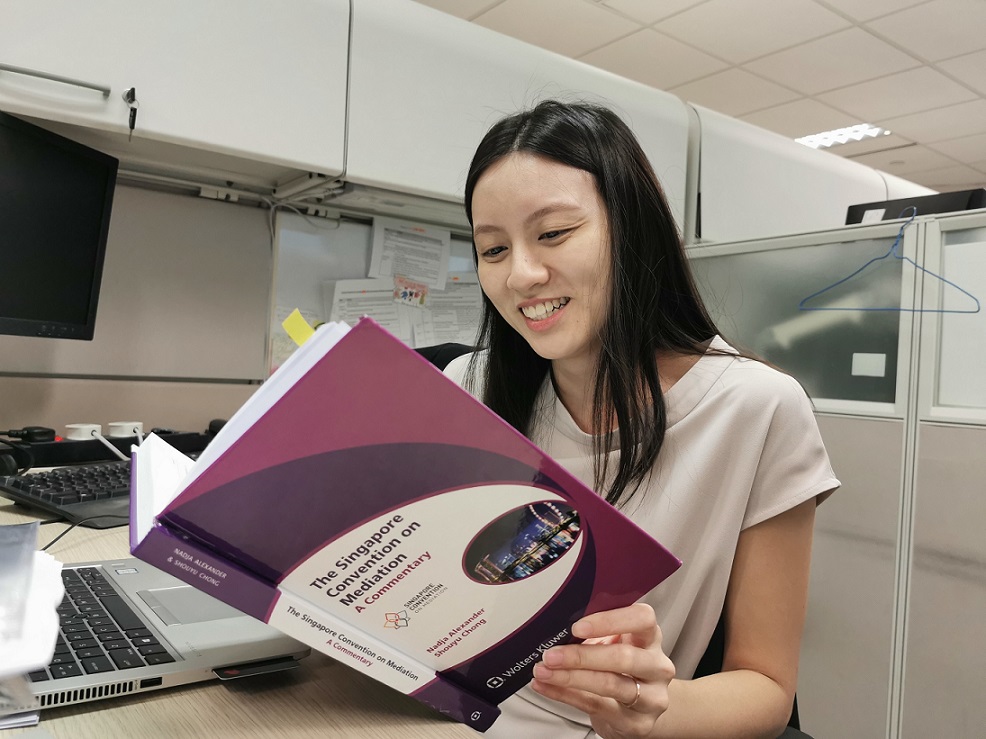
Ms Ng shared one case she has a stark memory of, involving parents undergoing a divorce, who could not agree on the care arrangements for their child: “Their relationship was rather acrimonious at the start. They could not even have a conversation with one another without it dissolving into a quarrel. But through mediation, and with the patience of the judge mediator who took the time and care to speak to each parent individually to understand their interests, the parents were able to look beyond each other’s legal positions to the real interests at heart. They eventually reached a settlement agreement and by the end of the mediation process, the parents were not only communicating civilly, but were also having some meals together. My client shared with me that the mediation process and the mediator had moved him – I was amazed at the transformation.”
Practical Mediation
Working alongside Ms Ng in the Policy Advisory Division is Assistant Director Maryam Hasanah Rozlan. Before she crossed over to the Policy Advisory Division in July 2020, Ms Maryam spent four years as a lawyer at the Legal Aid Bureau (“LAB”), helping Singaporeans and residents in need of legal assistance, advice and aid. From her time at the LAB till now, mediation has featured prominently in her work and projects, a testament to the affinity between her and the subject.
Like Ms Ng, Ms Maryam handled a bulk of cases involving family law matters whilst at the LAB, a majority of which were resolved through mediation. Her experience with mediation advocacy in family and matrimonial cases has inculcated a strong belief in the benefits of mediation.
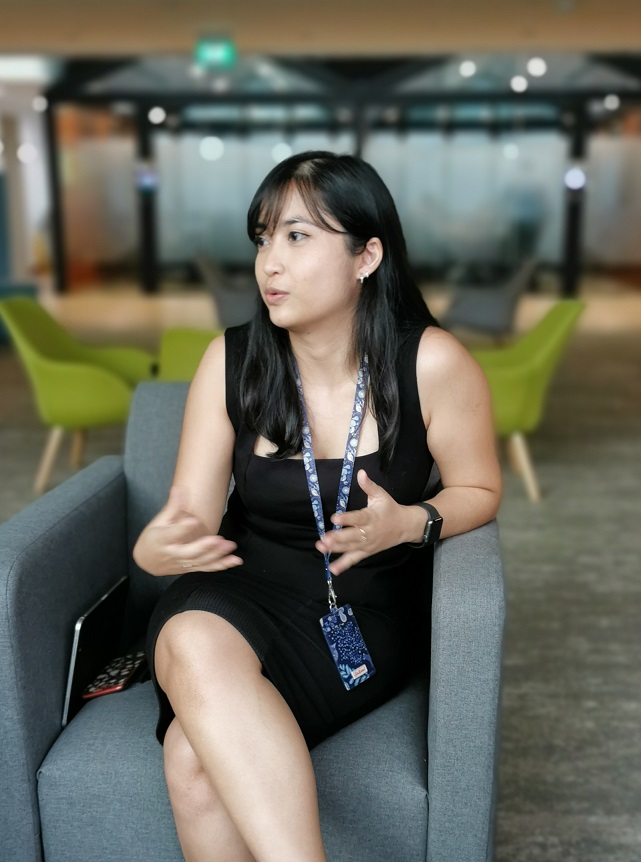
“I saw how mediation helped warring parents set aside their differences for the sake of their children and allowed parties to address misunderstandings head-on. It brought together and healed broken families, and helped them move forward,” she says.
Ms Maryam has also been an Associate Mediator with the Singapore Mediation Centre (“SMC”) since 2018. One of the youngest mediators to attain the accreditation, she co-mediated her first case with the SMC in 2019, and facilitated a successful resolution between the parties.
A firm advocate of mediation, Ms Maryam joined the Organising Committee for the Singapore Convention on Mediation Signing Ceremony and Conference in 2019 – a Ministry-wide effort that involved over 300 Ministry of Law officers in various roles, managing events with more than 900 delegates.
A year later, when she was posted to the Policy Advisory Division, she joined Ms Ng and the team working on the domestic legislation for the Singapore Convention on Mediation (“Convention”) – a seamless and natural transition for the mediator and mediation advocate.
The Making of the Act and Rules
The Convention, which is the first UN treaty to be named after Singapore, is the first of its kind, providing an efficient and harmonised framework for the enforcement and invocation of mediated settlement agreements for cross-border commercial disputes.
The Policy Advisory team, together with the Legal Industry Division at the Ministry of Law, worked closely with other government agencies on the domestic legislation for the Convention – the Singapore Convention on Mediation Act 2020 (“Act”) and the Supreme Court of Judicature (Singapore Convention on Mediation) Rules 2020 (“Rules”). The Act implements Singapore’s obligations under the Convention, while the Rules are subsidiary legislation under the Act which set out court procedures for applications under the Act.
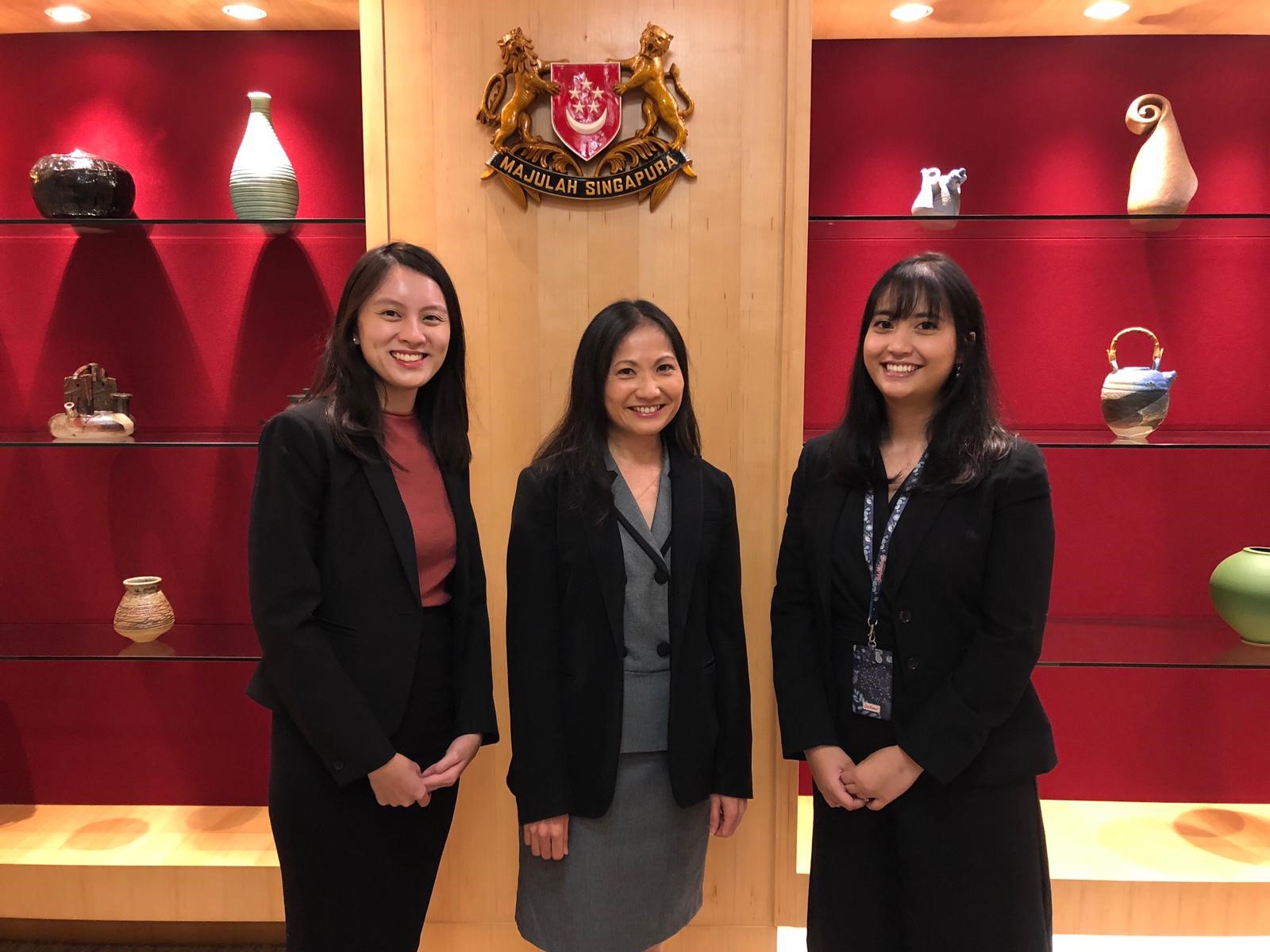
Ms Ng and Ms Maryam with Director-General Sharon Ong, who leads the International & Advisory team at MinLaw.
For Ms Maryam, her experience at the LAB came in handy in the process of drafting the Rules, where she brought her recent expertise with court procedure to the team. She says, “It is definitely useful to have had that perspective on the ground. While the Convention and the Act provide the overarching framework, the domestic rules which provide for the procedures need to be practical and workable in real life.”
For Ms Ng, the domestic legislation also marked a personal first in her career as a lawyer and a public servant – the Act was the first legislation she had worked on since leaving private practice in 2018.
From witnessing the Convention as a freshly adopted international convention in 2018, to assisting with the organisation of the signing ceremony in August 2019, and seeing the domestic legislation through from drafting to commencement, it has been a fulfilling two years for the former-family law practitioner.
The highlight, she says, was seeing the domestic legislation commence on 12 September together with the entry into force of the Convention, just over a year after it opened for signature. There are currently six parties to the Convention – Singapore, Fiji, Qatar, Saudi Arabia, Belarus and Ecuador.
“It is highly rewarding to have had the opportunity to witness the life cycle of the legislation, from partaking in the deliberations on policy issues in the beginning, to seeing the commencement of the legislation now,” she shares.
“Domestically, we had discussions and consultations with mediation experts and institutions on the operation of the Convention in Singapore. Everyone, including our colleagues at the Attorney-General’s Chambers (AGC) and the Courts, came together to push this through, which I think was not just because they knew it was significant for Singapore, but also testament to a belief in mediation being an effective and beneficial means of dispute resolution.”
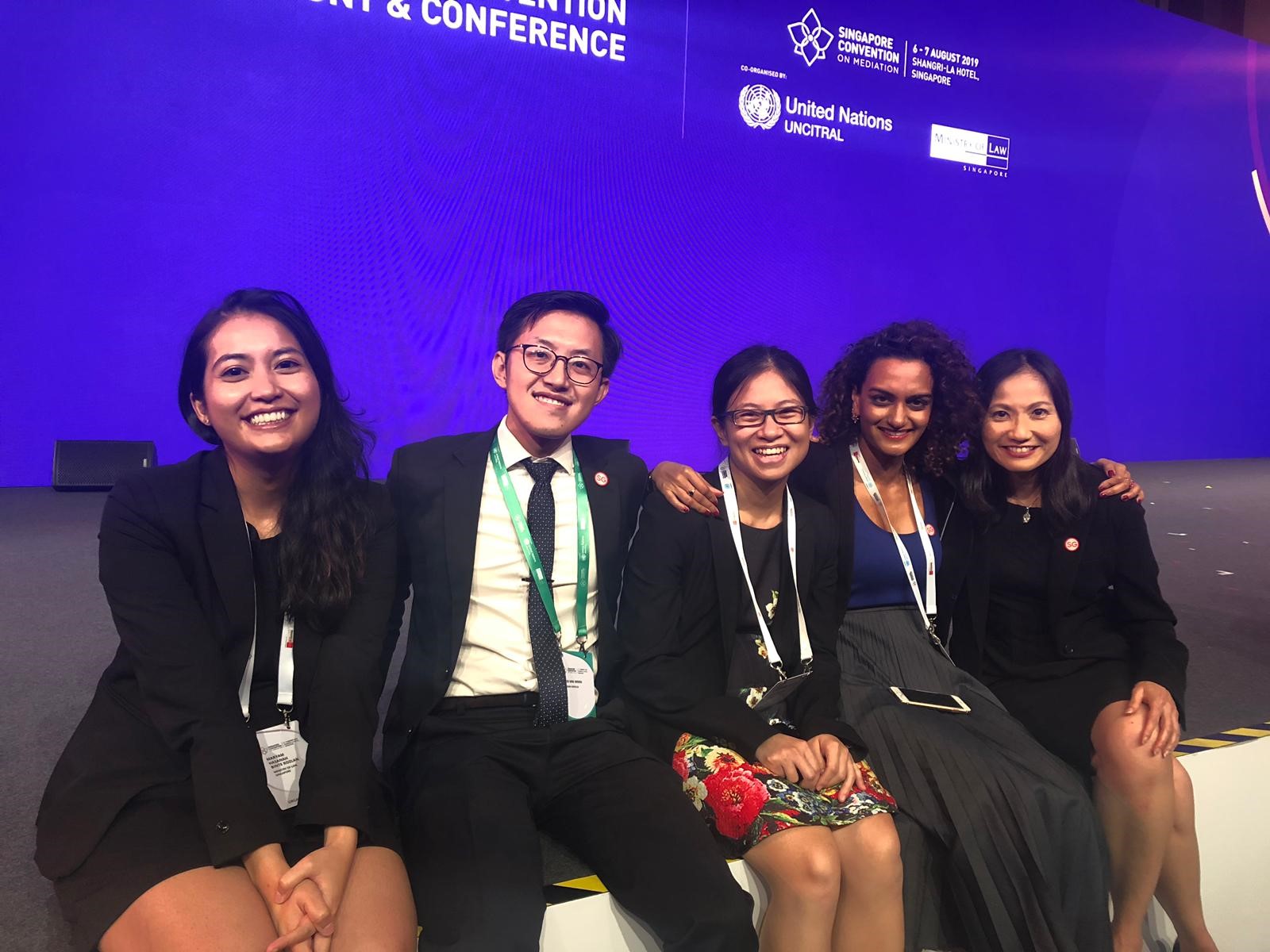
Ms Maryam (extreme left) with MinLaw colleagues at the Singapore Convention on Mediation Signing Ceremony and Conference in 2019.
A Milestone in Mediation Practice
With the Convention in place, businesses seeking enforcement of a commercial mediated settlement agreement across borders can now do so by applying directly to the courts of countries that have ratified the treaty.
Ms Maryam says: “To me, the Convention and Singapore’s ratification is an impressive milestone in mediation practice. When I first began learning about and taking up training in mediation in 2015, mediators were saying more needed to be done for the benefits of mediation to be appreciated and for mediation to be regarded as a profession. There has been so much progress since – there is now an international treaty recognising mediation as a means of resolving international commercial disputes.”
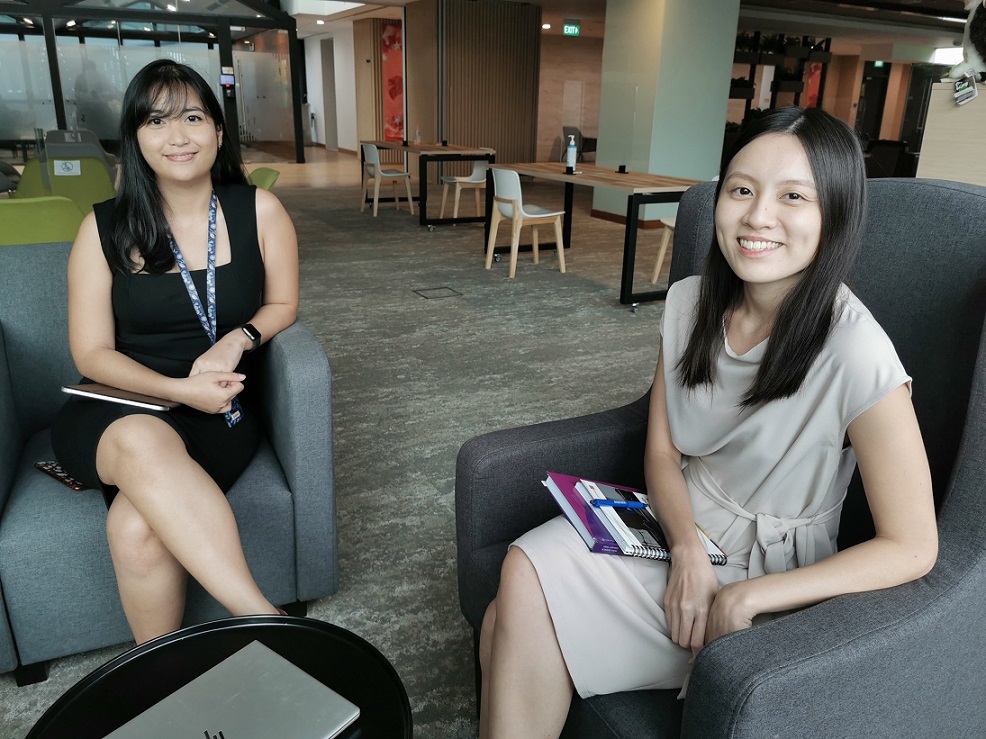
Ms Maryam (left) and Ms Ng (right) from the Policy Advisory Division in the Ministry of Law.
Reforming the Law
Apart from the Convention, Ms Maryam and Ms Ng work on a range of matters as part of the Policy Advisory team, providing legal input on policy formulation and implementation undertaken by other policy divisions in the Ministry of Law, and driving law reform in other areas.
The opportunity to work on a medley of policy and legal matters drew them both from family practice to the Policy Advisory team. For Ms Maryam, having had four years of legal practice left her with a yearning for a broader perspective.
She says: “I wanted to move away from managing and litigating cases and get involved in making bigger, more far-reaching change, to benefit others. I was also keen to develop new skills and perspectives, to help me serve others better, moving forward.”
The pair is also part of a team reviewing the landscape of litigation funding in Singapore, broadly involving the funding of dispute resolution proceedings by persons other than the parties to the proceedings. Additional funding options provide litigants with more means to fund meritorious claims, and may also promote access to justice for certain litigants. The subject is a matter of personal interest for Ms Maryam and Ms Ng, who had both taken an elective module on access to justice in the same semester at law school, several years ago – yet another common thread between the two.
Ms Ng shares: “Having seen how the law and policies have the potential to shape society, families and individuals through my time in practice, I felt that a lot of impact could be made by policy-formulation and law-making. The advancement of access to justice and the rule of law, both core aspirations in the legal profession, are the very mission of the Ministry of Law – this attracted me to making the switch. My time here has granted me valuable opportunities to embark on areas of law reform for the public good – considering the needs and gaps in society, reviewing what other jurisdictions have done, hearing the views of stakeholders, and ultimately formulating policies and laws that are uniquely for the benefit of our society.”
Looking ahead
Developing policies and legislation is not a static effort, but an ongoing one that requires long-term review and refinement. Even as the Convention, the Act and the Rules are in place, the work continues for Ms Ng, Ms Maryam and their colleagues at the Ministry of Law.
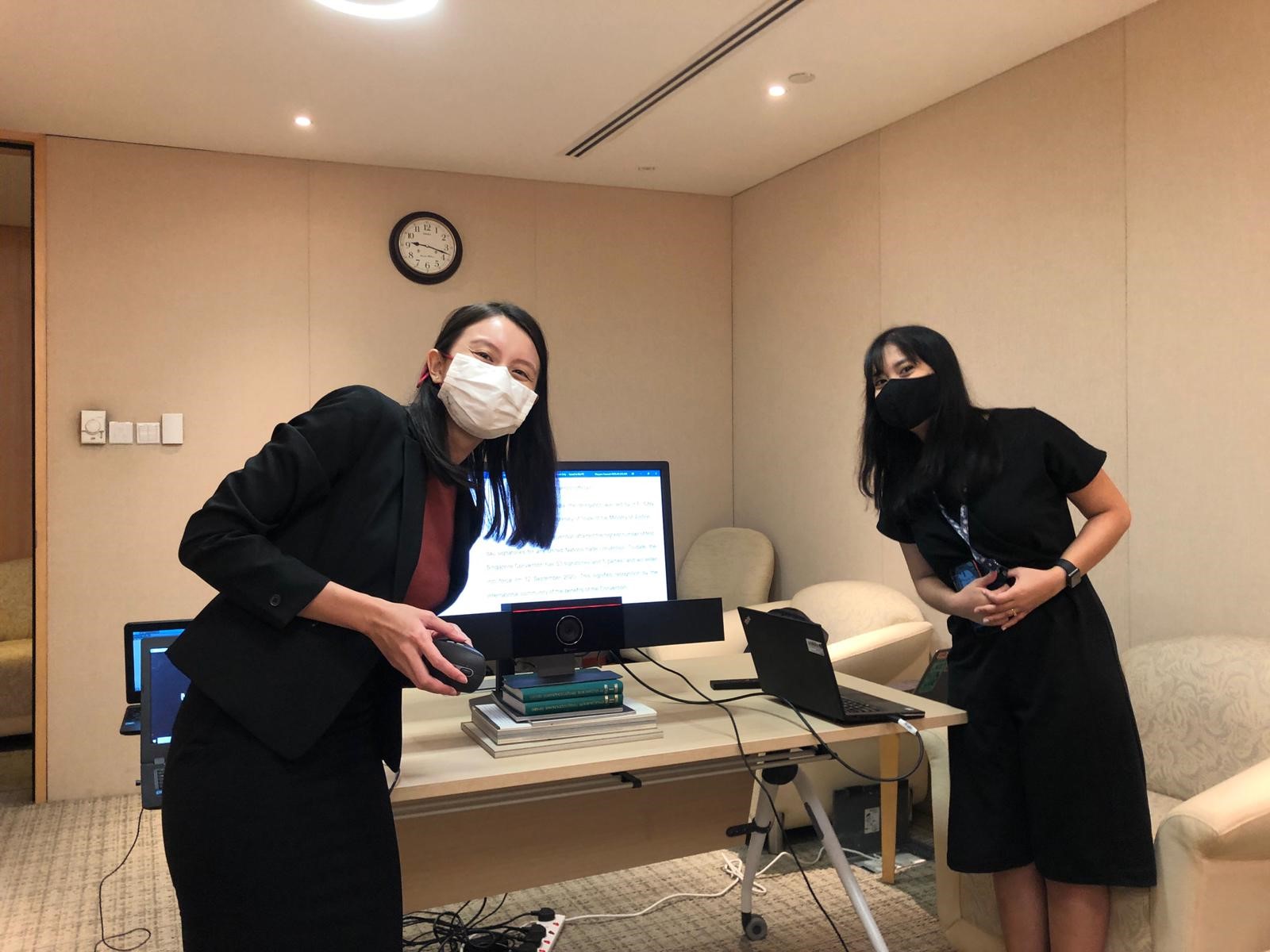
The work continues in the face of COVID-19. Ms Ng and Ms Maryam setting up video conferencing to facilitate bilateral exchanges on mediation and the Convention.
The Ministry works with countries, businesses and practitioners to promote the benefits of mediation and the Convention. Besides providing technical assistance to assist countries to work towards signing and ratifying the Convention, the Ministry also exchanges views with countries on the mediation landscape in their countries.
For Ms Ng and Ms Maryam, their work in promoting mediation and the Convention is especially timely in these uncertain times brought about by the COVID-pandemic.
Ms Ng says: “Many businesses face increasing risk of disputes during this time. But it could be a short-term disagreement; in the long run, they may still wish to preserve their working relationships. Mediation is therefore a good dispute resolution method in such situations, being less acrimonious than other forms of dispute resolution. It also allows businesses that may be struggling financially during this period to save costs and time in resolving disputes, and experience the satisfaction of compromising and coming to a solution together.”
There is also much to look forward to as they continue their work in other areas of reform.
Ms Maryam shares: “Having a meaningful career is important to me. I found my work back in the LAB extremely fulfilling, as I was able to witness first-hand the difference I was making in the lives of others. I am grateful that I am able to continue making a difference with the Policy Advisory team, though from a different perspective and in other spheres of society. There is still much to be done and needs to be met, but believing in the cause makes it worth the while.”
Last updated on 6 October 2020
Other stories you may like:
Global Experts Connect at Singapore Convention Week
From Arguing to Shaping Our Laws

